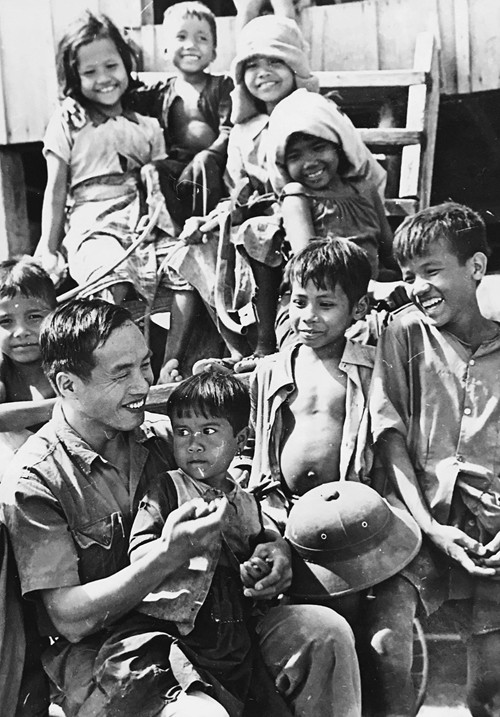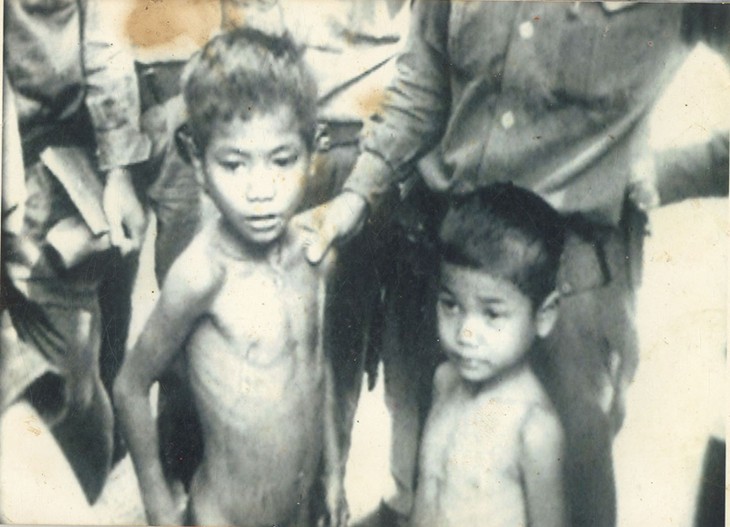(VOVWORLD) - 40 years after Vietnamese volunteer soldiers helped the Cambodian people overthrow the Khmer Rouge regime, the image of the “Buddhist saviors” has remained in the minds of the Cambodians. A VOV reporter in Cambodia recently talked to some Cambodian people about their feeling towards Vietnamese volunteer soldiers.
 Cambodian children and a Vietnamese volunteer soldier after defeating the Pol Pot regime. Cambodian children and a Vietnamese volunteer soldier after defeating the Pol Pot regime. |
VOV met with Norng Chan Phal at the Tuol Sleng Genocide Museum one evening in late 2018. The museum was Security Prison 21 (S-21), a notorious centre of detention and torture that killed at least 20,000 people under the Khmer Rouge.
Norng Chan Phal was one of the four children saved by Vietnamese and Cambodian soldiers when they liberated Phnom Penh in January, 1979. Norng Chan Phal recalled those terrible days in that “hell on earth” 40 years ago.
“Many people were squeezed into a room. I didn’t see them kill people. I saw them pulled people out of the room. I heard people cry and scream and then silence,” Norng said.
Norng Chan Phal said the worst moment was when he and his younger brother were pulled out of their mother’s hands into another detention room. That’s the last time they saw their mother. They didn’t know what happened to her. It’s a stroke of luck when a few days later Vietnamese and Cambodian soldiers liberated Phnom Penh and overthrew the Khmer Rouge.
Norng said: “Vietnamese soldiers changed our prisoner clothes. Our bodies were covered with insect bites. We hadn’t eaten anything for several days. They cooked rice for us. When we finished eating, they marched off.”
 Norng Chan Phal and his younger brother Norng Chan Phal and his younger brother |
Pointing to a photo of the four children saved by Vietnamese soldiers from S-21 prison, Norng Chan Phal said, “Vietnamese soldiers gave birth to me for a second time. If they had come a few days later, all of us would have died like thousands of other children in that prison.”
“When we were in the orphanage, Vietnamese soldiers took care of us as carefully as their own children. They taught us etiquette. When they had free time, they visited us, gave us fruits, or took us out to play. In the early 1980s, the Vietnamese soldiers returned to Vietnam and since then I haven’t heard anything from them. I hope I will meet them again one day,” said Norng.
From 1975 to 1978, the Khmer Rouge regime killed about 2 million Cambodians – about 25% of Cambodia’s population in 1975. Researchers say the Khmer Rouge was one of the most brutal regimes in the 20th century.
Everywhere in Cambodia one can see the legacy of Vietnamese soldiers helping Cambodian people survive the Khmer genocide. Chour Sok Ty, Director of the Killing Field of Choeung Ek, said: “I thank the Vietnamese soldiers for saving me from Pol Pot’s genocidal regime. I will always remember them. If there was no historic day on January 7, I didn’t know how my life would be.”
Vong Sakhon said Vietnamese soldiers are heroes and close friends of the Cambodian people: “I was very happy to meet the Vietnamese soldiers. They were good and frank people. I thank them for coming to liberate us from the Pol Pot genocidal regime. I hope the Cambodian-Vietnamese relationship will prosper.”
Cambodian Minister of Tourism Thong Khon said: “We will never forget January 7, 1979. If there were no Vietnamese army, Cambodian National Liberation Front, or Cambodian soldiers, we would not have gotten rid of the Pol Pot genocidal regime. Since then the Vietnamese-Cambodian relationship has continued to grow.”
In fierce operations against the Khmer Rouge regime, tens of thousands of Vietnamese soldiers died and thousands more lost parts of their bodies. Their sacrifices will forever be written in Cambodia’s history.